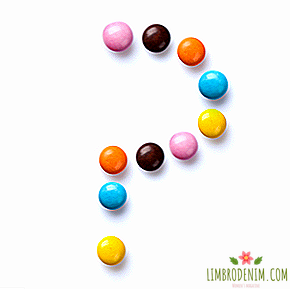Why do we love sweets and do we need to fight it
Love sweet - this is part of our nature. The mechanism of attachment to sweets is explained in its works by the cognitive philosopher Dan Dennett: long before we had the opportunity to stand at the counter, choosing between pea seedling salad and eclair, our ancestors spent days on end in search of food. To stimulate the consumption of nutritious food, foods with a high energy content should have been in our range of preferences. Therefore, evolutionarily in us lies the fact that all the most high-calorie - sweet and fatty - causes us a positive reaction.
In other words, pleasant sensations when fixing the sweet taste is an intuitively developing preference for high-energy food. But the fact is that donuts, chocolates, condensed milk and even grandmother "Napoleon" were not taken into account by evolution. Darwin's girlfriend hoped that in the pursuit of essential nutrients, we will eat fruits, not cakes. Why, then, in a state of stress, do we want to destroy a box of truffles or a Prague cake, and not to eat an apple or, in extreme cases, a banana?

The answer to the question birds know. Birds and Nikolaas Tinbergen - a Dutch ethologist and ornithologist, winner of the Nobel Prize in Physiology and Medicine in 1973 "for his discoveries related to the creation and establishment of models of individual and group behavior of animals." Tinbergen introduced the concept of "superstimulus" after his experience with seagulls: he made the orange spot on the bird's beak bigger and brighter, with the result that the chicks pecked him much more actively - it attracted them more and liked them more. So a simple stimulus (a standard beak with a small dot) became a super stimulus (an enlarged orange spot). And in the same way, Oreo cookies excite most of us more than the prospect of eating a pear. A super stimulus more actively than a simple stimulus influences the construction of constructive connections in our brain and forms our taste preferences. Therefore, the addiction to chocolate can occur after the first acquaintance with him, but the habit of snacking on fruit instead of a bar can be developed over long months. From a certain point of view, sweet foods are not so bad in themselves. In many ancient cultures, it is such food that is considered useful or healing. Thus, in the ancient system of Indian medicine, Ayurveda has the concept of "sattvic nutrition", by adhering to which you can achieve a sharp mind, strong body and well-being. "Of the six tastes, only sweet is considered sattvic because it is pleasant, nourishing and has harmonizing properties," writes Yoga Journal Russia. Wild sugar cane stalks have been cultivated in India for thousands of years, and even before the beginning of our era, cane sugar came to Europe in the form of syrup and as a medicine. Under the authority of the Arabs in the IX century, sugar began to be produced in Egypt, southern Spain and Sicily. And in the tenth century in Venice, sugar acquired the shape of conical heads.
However, almost ten centuries passed before sugar ceased to be a drug or a luxury item. Only in the nineteenth century refined was widely distributed, and mankind - many health problems. In modern traditional medicine, foods with a high content of glucose are indicated for physical exhaustion, intoxication, for a number of liver diseases, and shock conditions. In case of poisoning, no one will force the patient to chew healthy nuts or choke salad - in order not to load the body with food, but to quickly fill it with energy, they will be given sweet water or tea. And those who ran the marathon at least once know what a saving and stimulating effect glucose has on a seemingly already dead body, so for high-intensity workouts athletes are also given glucose.

In the modern world, love for sweets is equated to a mild form of drug addiction.

In 2009, a professor at the University of California at San Francisco, pediatrician and endocrinologist Robert Lasting uploaded the video "Sugar: Bitter Truth" to the network. The one and a half hour lecture, which was watched by almost 5 million people, explains the mechanism of the effect of sugar on our body in terms of biochemistry. Lasting explains that sugar (sucrose) consists of two simple sugars: glucose and fructose. Glucose is also found in starchy foods such as potatoes, our body reproduces glucose and it is a necessary nutrient for it.
A completely different story with fructose. People do not reproduce fructose and have never consumed it on a regular basis - only during the fruit season, which before the advent of modern agriculture and globalization accounted for a meager number of months in a year. And if any cell of our body can assimilate glucose, then only liver is taken for killing fruit. And quickly gives up - with large amounts of incoming fructose, the liver gets tired of messing with it and sends it far away, that is, in the fat reserve. Lasting believes that excessive consumption of fructose causes irreversible metabolic disorders, inflammation of the liver, acute heart disease, diabetes and cancer. In addition, the scientist believes that fructose affects the violation of the regulation of the level of body fat, when the body begins to increase its "reserves", instead of spending the calories it receives on active life. Dr. Lasting's opinion on the role of insulin metabolism disorders in the process of accumulation of excess weight is shared by the scientist and practicing surgeon Peter Attiya. For many years, the doctor saw on his operating table obese people suffering from diabetes and in need of limb amputation, and each time he himself judged them: “How can you start your body like this? How can you let excess weight ruin your health?” Ironically, a zealous athlete and adherent of a strict diet, Attia himself became ill with "acquired" diabetes. It made him rethink his attitude. Today, he is working to control the level of insulin in the blood in order to prove that, possibly, excess weight is only a consequence of metabolic disorders and such health problems as diabetes. "What if people get sick not because they are fat, but because they are sick, because they are sick?" - one of the main questions of the lecture "Obesity hides a big problem", which Robert Attiya finishes, barely holding back tears of repentance. All this means that insulin and sweets should be monitored for those who have no weight problems at all.

You can not overeat cakes, but recover from the use of sugar. We know that even the fattest sandwich or pizza is less likely to turn into folds on our sides, if you do not drink them down with sweet coffee and cola. However, our taste habits, and sometimes a keen passion for sweet drinks, encourage us to do just that. In the modern world, love for sweets is equated to a mild form of drug addiction: sugar does not carry any vitamins or microelements, spoils health, but also causes the release of endorphins into the blood. Ate - got pleasure. Already there are "sugar rehaby"! One of them, with the slogan "Get rid of sugar - start living life to the fullest!", Opened the Swedish professor Bitten Jonsson. The treatment takes from one month to six months; in the process, the patients go through the same stages as the other dependent ones, from depression and anger attacks to exacerbated physical discomfort. You can volitional decision to abandon the sweet, but to get it secretly together with industrially manufactured products. Everyone knows that "sugar sells", so today it can be found in bread, ketchup, lasagna, canned beans, pate - and so on. Only not on the label of the product - the food industry lobby, hiding behind the need to “keep the recipe secret”, has achieved that it is not necessary to put information on the amount of sugar in the finished product on the packaging.

Maintain the necessary level of sugar in the blood and not be tempted to eat sweets can be due to proper diet

For decades, commercials have taught us to eat chocolates, while the sweet one wants to eat more - after the short-term feeling of satiety, there is a sharp drop in blood sugar levels, after which hunger overcomes even more. As planned by the corporations, it is at this moment that the next chocolate bar should be caught in hand - until such a food cycle fails and the client inherits to pharmaceutical companies. At the same time, it is possible to maintain a level of sugar in the blood (a guarantee of good health), not to have an acute feeling of hunger and the temptation to eat sweets through proper diet and eating complex carbohydrates. The latter, in contrast to their fast and harmful brothers, require more time for assimilation, smoothly increase blood sugar levels and saturate us for hours. As an option: unsweetened oatmeal ("real", which must be cooked, but not soluble in boiling water flakes) or a pillar of Russian dietetics - buckwheat - for lunch. And the classic board of nutritionists is often relevant (5 times a day) in small portions - intervals of more than three hours in food cause a sharp drop in blood sugar, as a result, strong hunger and temptation to eat sweets, as well as slow down the metabolism. Low blood sugar risks and problems with mood, provokes attacks of anger and loss of control over themselves. Fanatically rejecting sugar in any form, you can inflict even greater harm on your health if the alternative is unsafe sugar substitutes. Replacing sugar with pure fructose, as it turned out, is a very controversial idea. Synthetic substitutes can harm the pancreas and cause chronic diseases. Against their background, herbal options that have been popular in recent years, such as stevia, look attractive. Shredded leaves of shrubs from Latin America today are used as an organic sweetener. Steviol (an industrial derivative of steviosides and rebaudiosides, two components of stevia) was criticized in the 80s when it was suspected of mutagenicity. However, after WHO recognized steviol safe in 2006, its popularity is only growing.

In an attempt to teach a sweet life without sugar to live, nutritionists and cooks offer all new recipes. So, Khomaro Kantu published the book "Magic berries. Diet recipes", which tells how to fool the receptors with the help of an exotic product and get a taste of your favorite desserts, eating at least a steamed turnip. As a result, it is pleasant to know that there are things that do not change for thousands of years - honey is still useful for us. A young scientist, a specialist in bees and their livelihoods, Noah Wilson-Rich is confident that the sugars contained in honey are suitable for a healthy diet and have a positive effect on our well-being. Noah founded the Best Bees Company to support people who want to start their own hive and take care of it even in a big city. For those who do not dream of their apiary on the balcony, it is enough to buy a jar of good honey instead of a pack of sugar.
Photo: 1, 2, 3, cover photo via Shutterstock




